Last Updated on
Have you heard about baked oatmeal? It’s magical. I first heard about it on TikTok.
I watched as the TikTok creator blended a few ingredients together—oats, an egg, a splash of milk, cocoa powder, and a few other items. She popped the mixture in the oven and when she pulled it out, it was like one of those gooey lava cakes you order to finish off your meal at a restaurant.
Baking oatmeal was the life hack I needed.
“What else could I blend together and turn into a cake?” I wondered. I went to TikTok’s search bar and typed in baked oatmeal to find out.
As it turns out, quite a few people use TikTok’s search bar to find things they want. In fact, 40% of Gen Z use TikTok instead of Google to get answers to their burning queries.
Let that sink in—nearly half of an entire generation doesn’t use Google.
As someone who writes content for a living—content to rank on Google—I wanted to know more about why people like myself were abandoning Google and turning to TikTok.
To dig into the search preference of TikTok users, I decided to conduct a survey where I asked four open-ended questions to people who use TikTok as a search engine:
- What types of things do you search for on TikTok?
- Why do you prefer using TikTok for these searches over Google?
- What types of things do you search for on Google?
- Why do you prefer using Google for these searches over TikTok?
I heard from 50 people of various ages and genders. And while it’s certainly not a perfect survey, I gleaned some fascinating insight from it.
By going through this article, you’ll learn what people are searching for on the various platforms, and how to create content to satisfy user needs.
What people search for on TikTok
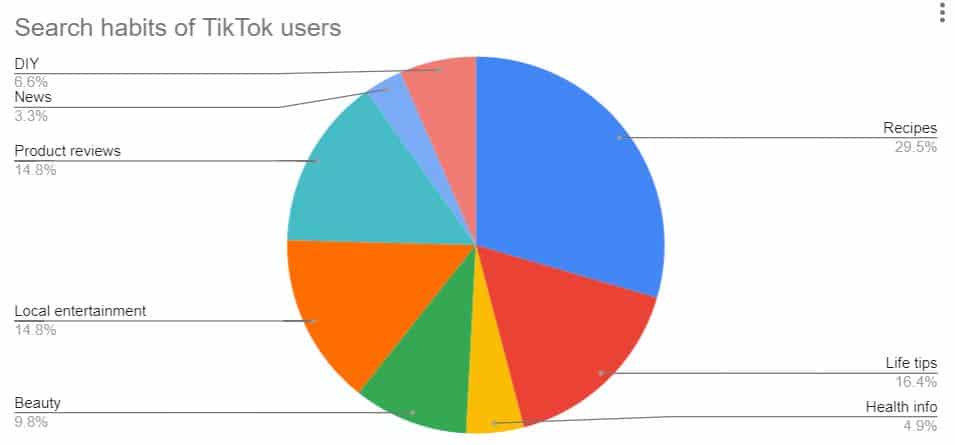
The majority of people surveyed use TikTok to search for recipes. One respondent noted that the comments within TikTok videos are better social proof than the comments on recipe blogs; they trust TikTok videos more when it comes to cooking content.
Life tips is a broad segment that came in second. This segment includes things like business tips and life hacks. Think of life tips as any bite-sized tip to improve your life (i.e., how to clean your kitchen sink, marketing tips for new businesses, getting tomato stains out of shirts…those kinds of tips).
No surprises there—TikTok is fantastic for gathering quick information.
The next most popular category was tied between local entertainment and product reviews. People use TikTok to search for things to do, restaurants to eat at, and attractions to see in their home towns and places they plan to visit. They also enjoy getting first-person testimonials about products they want to buy.
The least popular searches were for health information and news. The people I surveyed don’t aren’t keen on receiving anything health or news-related via TikTok.
⭐Key Takeaway: People surveyed mostly use TikTok to search for recipes and quick tips.
What people search for on Google
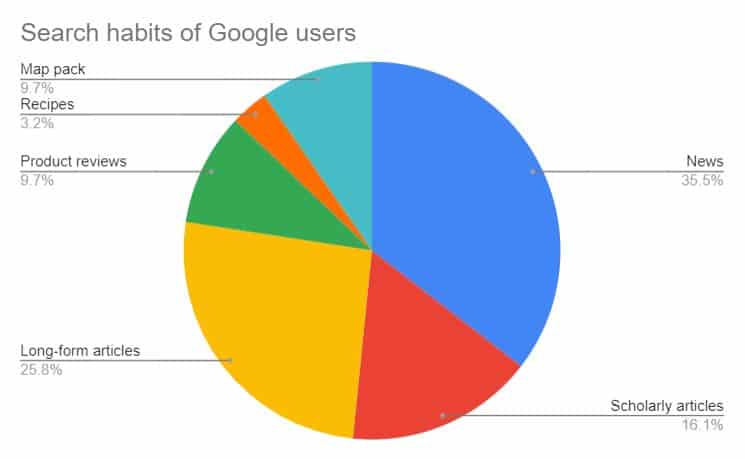
When we compare searcher habits from TikTok to Google there is a stark difference.
Respondents said they don’t use Google to search for recipes and it seems they gravitate towards TikTok for food-related content. But, as one respondent mentioned, they still Google recipes when they need additional instructions to help them prepare the meal.
Does that mean recipe blogging is obsolete? Not so fast. A quick search for the term “recipes” on Google Trends shows a very slight downward trend starting around 2020, around the time TikTok became mainstream.
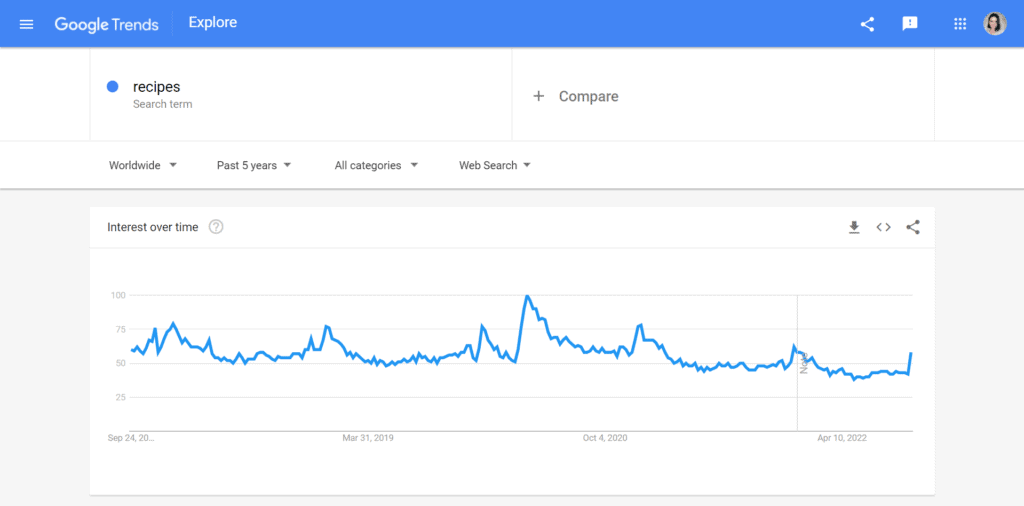
However, this doesn’t necessarily correlate to TikTok. And it doesn’t mean Google is irrelevant for food bloggers (the search term mac and cheese recipe gets roughly 165k searches per month…Google still gets plenty of action for recipe-related searches).
As for the most popular searches on Google, people say they turn to Google for news-related articles. People also enjoy using Google to find scholarly articles, long-form articles, and any information from the Map Pack (i.e., hours, address, location, or contact info for a business).
⭐Key Takeaway: People surveyed mostly use Google to search for articles (news, scholarly, and long-form).
Why people prefer…
Here’s where we get more context to the above numbers.
As I read through respondent’s answers, I noticed plenty of similarities, making it easy for me to distill their answers into a few concise points.
TikTok over Google
People prefer TikTok over Google for the following reasons:
- Content is to the point and easier to digest on TikTok
- TikTok’s videos are visual and entertaining
- It’s easier to find what you’re searching for
- Results are fresh and timely
- There’s social proof in the comments
- TikTok shows content from both large and small creators on the For You Page (FYP), not just big brands
It seems people enjoy getting fast answers to their questions. Which is a stark contrast to Google where it can take you 10-15 minutes to read a full article.
I also found it interesting how multiple people pointed out that they don’t like how the first page of Google’s results are filled with large websites. To them, it feels inauthentic. And that’s where TikTok shines. Users enjoy seeing content from both small and large creators—it feels less corporate and instead, more relatable and trustworthy.
Google over TikTok
But just because people like TikTok for some things, doesn’t mean it’s perfect. Users turn to Google because:
- Content on Google gives the why AND the how (TikTok usually just gives the how)
- It’s easier to compare prices for products and shop for what you need
- You can browse Google leisurely without getting over-stimulated with results
- The search functions are more sophisticated on Google, and you can refine your search queries better than on TikTok
With Google, people seem to turn to it when they want long-form content that’s packed with information OR when they are about to buy something.
TikTok and misinformation
I found it interesting several people noted a lack of trust with Google. People pointed out that good information in Google is buried in the search results, and that things like People Also Ask (PAA) is often inaccurate, like this result below (Jack Astor’s is a restaurant chain, yet Google’s PAA is inaccurate and doesn’t show the right answer):
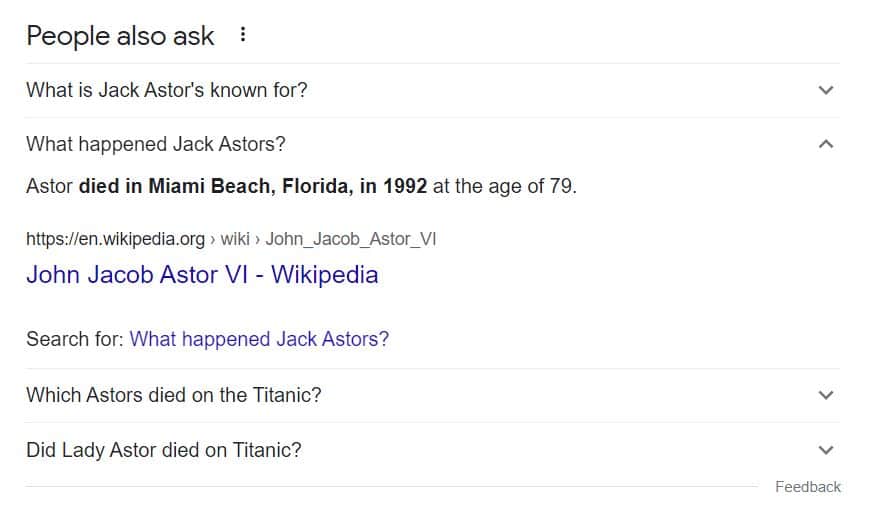
With that, they said they trust the information on TikTok more than they trust Google.
However, a study found that 1 in 5 videos posted to TikTok contains misinformation. In short, TikTok is neither more or less trustworthy than Google—but users seem to think it is.
I recently spoke to Jason Osler, a reporter from CBC, about the issue with misinformation on TikTok. CBC aired the episode on radio stations across Canada—you can listen to it here (the segment is only around three minutes long). I’ll summarize the main points below:
- Misinformation is a problem on TikTok.
- TikTok currently has no good system in place to vet the information that lands on the FYP, unlike Google’s E.A.T. (expertise, authority, and trust)—a search quality rating guideline that helps Google determine the content that ranks on the first page.
Misinformation will always be an issue even on platforms that have a vetting process. As creators of content, we need to do our due-diligence and ensure everything we share with our audience is factual and correct.
Leveraging both TikTok and Google as a creator
Here are a few takeaways if you plan to create content for both platforms:
- People mostly use TikTok to search for TOFU (top of funnel) types of content, i.e., videos with quick tips, tricks, facts, and hacks. 👉 Consider creating more of this type of content for your TikTok and see how it performs.
- People mostly use Google to search MOFU/BOFU (middle and bottom of funnel) content, i.e., long-form articles that teach the how + why, product comparisons, business information (Map Pack). 👉 Consider creating more of this type of content for your blog and see how it performs.
- Social proof is important and easier to spot on TikTok. 👉 Don’t make readers search for it on your blog. Add it in as a social counter and encourage people to leave comments.
- People find content easier to digest on TikTok. 👉 Improve your blog’s readability so people get answers to their questions fast when they visit your site.
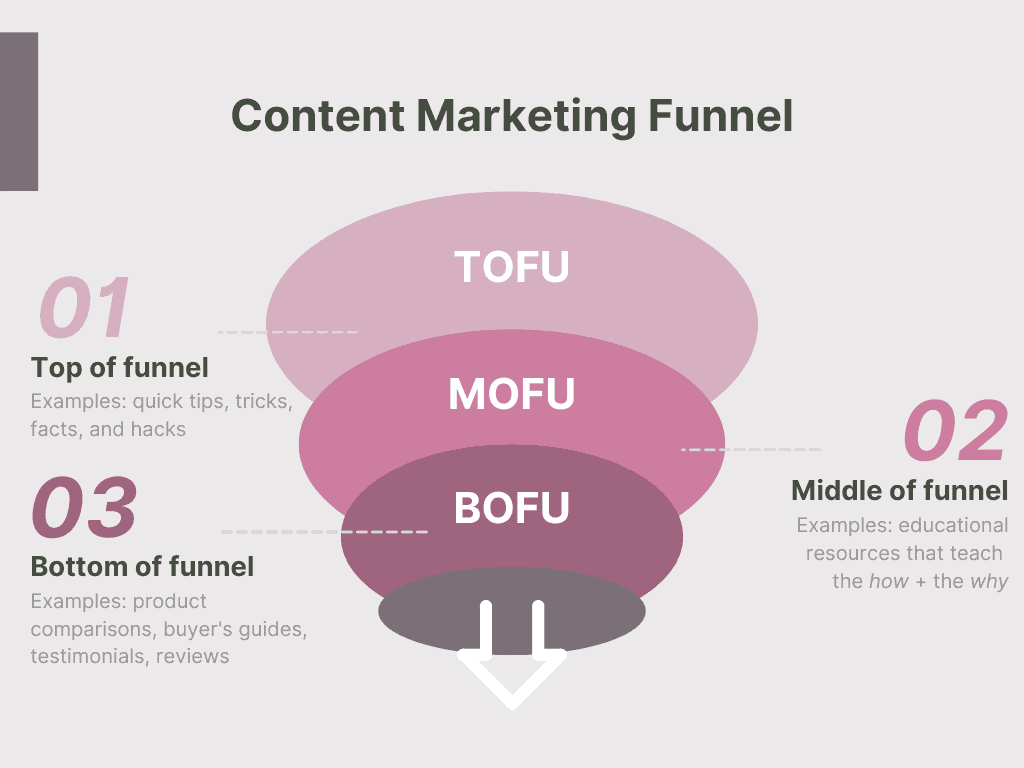
As with all content strategies, it’s essential to have a deep understanding of your audience to know what content they want to see from you! If you’re unsure, consider sending out a poll via your email newsletter or add one to your Instagram Stories to ask which types of queries (related to your niche) they search for on different platforms.
I’d love to hear your thoughts in the comments. Do you use TikTok to search for queries, and if so, what are you searching for?
This article may include affiliate links. As an Amazon Associate I earn from qualifying purchases.

Dana Nicole is an award-winning freelance writer for MarTech/SaaS who was rated one of the best SaaS writers by Software World. She specializes in writing engaging content that ranks high in search engines and has been featured in publications like Semrush, ConvertKit, and Hotjar.
Dana holds a Bachelor’s degree in Business Administration and has over 15 years of experience working alongside national brands in their marketing departments.
When Dana’s not working, you can find her dancing en pointe, cooking up new recipes, and exploring the great outdoors with her two big dogs.

